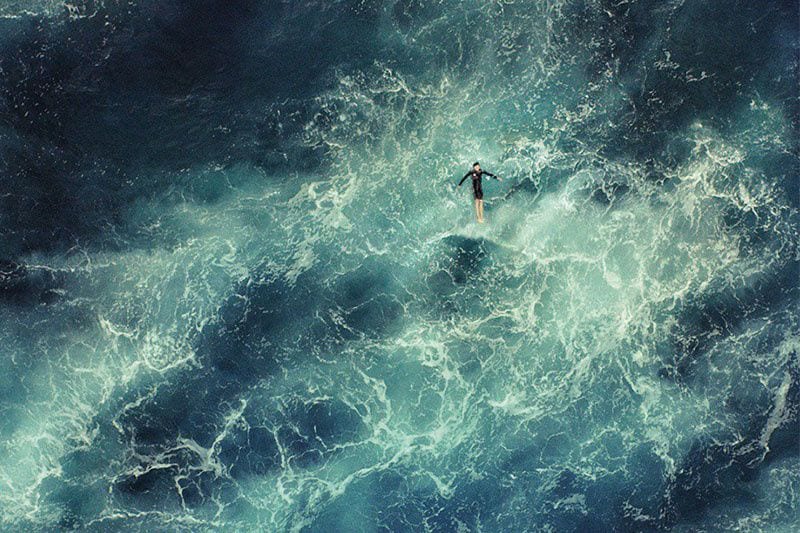
Early in the narrative feature Breath — based on author Tim Winton’s lyrical novel about a young teenager, Bruce “Pikelet” Pike, and his self-discovery through surfing the coasts of West Australia in the ’70s — the present-day Pikelet’s voiceover makes a poignant observation. “The sea was different that day,” the elder reminisces about the unusually rough waters, “but we went out anyway because we didn’t know any better.” The line is stated wistfully as a paean to a time when self-discovery was not limited by spoon-fed information, but instead cultivated by appreciation, capriciousness, beauty and loss.
The film’s pivotal scene shows Pikelet (Samson Coulter) nervously navigating rough yet gorgeous crystalline blue waters with his best friend, “Loonie” (Ben Spence), a reckless teen who hungrily ensconces himself in each roaring tube. This may sound like yet another nouveau-surfers-find-courage setup, but the scene’s gravity is earned from a generous offering of quiet, foundational moments throughout the film.
It’s refreshing, in an era when so many coming-of-age sports films feature devil-may-care extroverts, to experience by contrast the introverted, soft-spoken Pikelet as Breath‘s narrator. Pikelet is an observer by nature; a bookish brooder who understands how small moments are just as meaningful as adventurous crescendos. He’s the kind of kid who supplements his ocean adventures with library trips to read Joseph Conrad’s Heart of Darkness (a wonderfully subtle and revealing moment, among many).
As Breath suggests, perhaps Pikelet’s fondest memories of his friendship with Loonie are moments of repose away from the ocean — a bike ride full of bon mots on a rain-swept road, or backyard chores for a couple of bucks to buy their first used, glass fiber surfboards. This is all food for thought, not only as to the memories one ultimately holds sacred, but as to those film scenes, one surprisingly remembers several years down the road.
At the same time, Breath‘s use of Pikelet’s point of view for every surfing scene risks preciousness. If Pikelet is already so sagacious, and from a stable and eminently nurturing family, then what are the emotional stakes of him taking on increasingly dangerous waves? Breath touches upon this question through the boys’ newfound mentor, “Sando” (Simon Baker, who also directed the film).
Simon Baker, Ben Spence, Samson Coulter (Photo: © Nic Duncan 2014) (IMDB)
Sando is a prototypical surf guru with all the typical trimmings: he’s impossibly fit, scruffy, with a mop of sandy blonde hair and eyes reflecting both the ocean’s tranquility and treachery. He eventually takes notice of Pikelet and Loonie’s mettle and decides to guide them through gnarlier surf points like the novelistic “Old Smoky”, which is captured through sumptuous wide lens landscape shots conveying its mythic flavor.
The triangular structure between Sando and his new students is somewhat cliché. Sando regurgitates surfer wisdom about approaching waves “without a shred of doubt”, and of course, finding closeness to god through catching the most ferocious waves. Also predictably, Sando takes to Loonie, who surfs “like someone who didn’t believe in death”, and chides Pikelet for his viewpoints on the ocean’s inherent aesthetic value, and his trepidation to take on more monstrous waves. Every so often Sando’s wife Eva (Elizabeth Debicki), a former competitive skier who suffered a brutal knee injury years prior, delivers equally predictable sarcastic quips at Sando’s surfer-bro rhetoric.
What elevates Breath‘s somewhat conventional dialogue is the film’s visual fabric — often gray and rainy — which informs Pikelet of melancholy and bitterness deep within the shimmering waves and also in Sando’s “hippy love nest”. Eva’s pallidness and weary eyes portray a ghost of X-Games past. Sando’s glare at an indignant Loonie after he missed a single day of surfing captures a menacing bond between two obsessed adrenaline junkies. There’s no need for words.
Baker has a good eye for how to use little details in a room to build composedly provocative explorations of his characters. When Eva leaves Australia for an operation, Sando puts a photo of her most daring ski jump on the refrigerator. Is this the jump which shattered Eva’s knee? It’s a haunting thought and one which says more about Sando’s constitution and his relationship with Eva than his repetitive surfer bromides, or increasingly peevish responses to Pikelet’s reserve.
Breath goes astray in its vestigial third act, which explores Eva and Pikelet’s relationship without much psychological dimension save for a seemingly plot-driven, surface commentary on Eva’s own exploitative transgressions. Here, Baker seemingly wants to stay true to the book’s text. In trying to do so, however, he sacrifices the film’s character-driven exploration on its lead characters’ relationship with the ocean, and how it affects their regard for one another.
Still, because Breath — a nearly two-hour film in an age of streaming 80-minute talk-fests — takes its time with its material, the film can afford to meander and experiment without losing its way entirely. Baker confidently steadies the story for a poignant final act, which returns to what worked so well during its first hour.
Later in the film, Pikelet admiringly watches his dad do chores in their backyard — a stark contrast from the unimpressed looks he initially pays him. Surely, no adrenaline rush guarantees this kind of tender enlightenment. But as Breath implores, thoughtful waywardness is a rich path to wisdom, and the ocean is an ideal setting for it.


